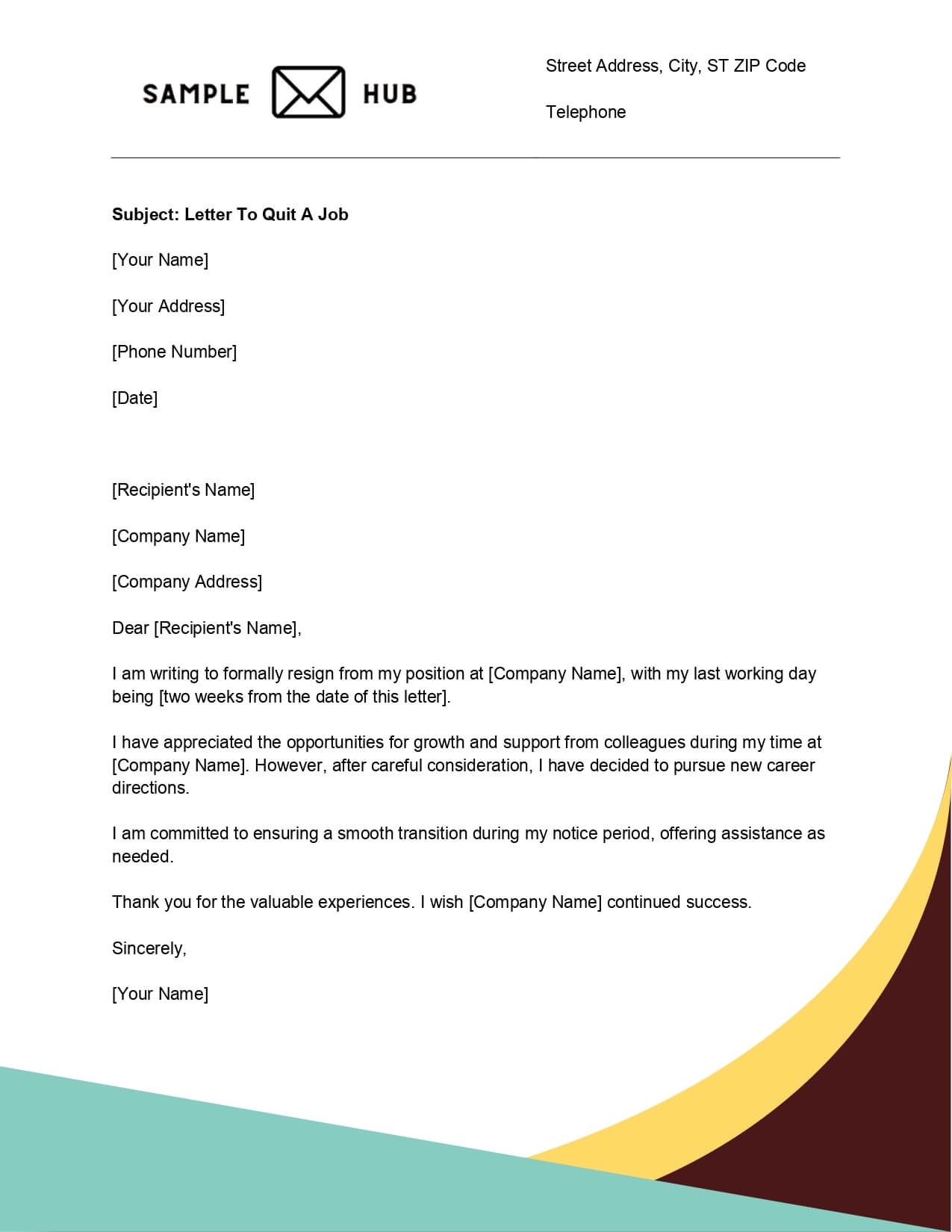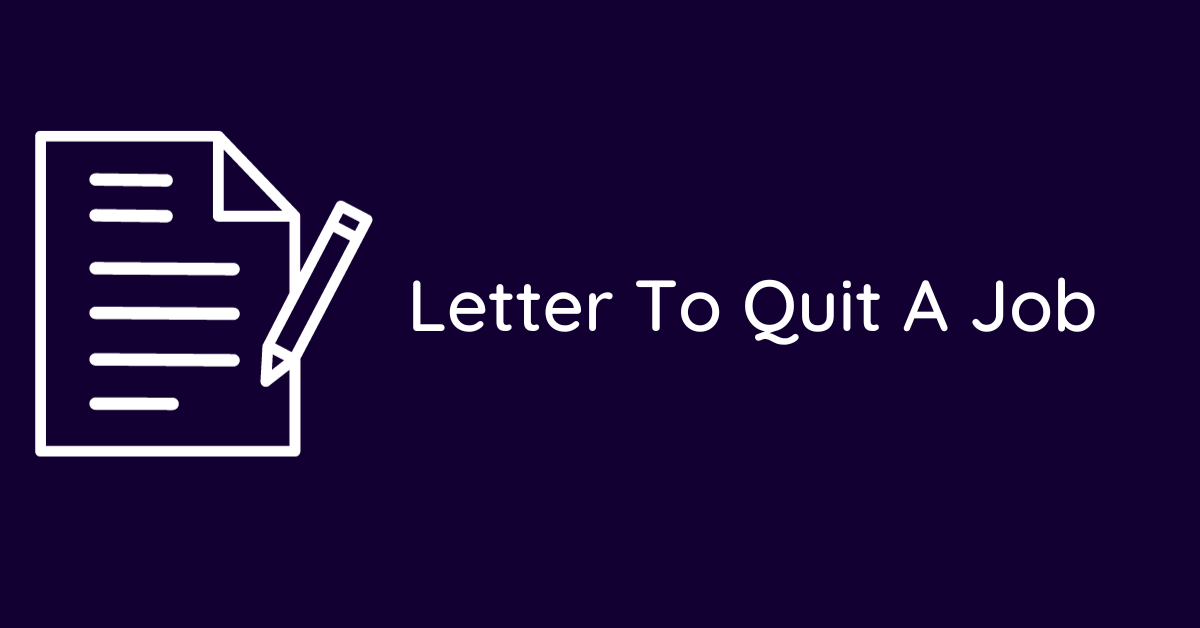Are you considering quitting your job? Writing a letter to quit a job is an important step in the process. It is a formal way to inform your employer that you are resigning from your position.
The purpose of this letter is to provide your employer with notice of your departure and to ensure a smooth transition for both parties.
In this article, we will provide you with templates, examples, and samples of letter to quit a job. We understand that writing a resignation letter can be a daunting task, especially if you have never done it before.
Our goal is to make it easy for you to write a professional and effective letter that will leave a positive impression on your employer.
Whether you are leaving your job due to personal reasons, a better opportunity, or any other reason, we have got you covered.
Our templates and examples will help you structure your letter and provide you with the necessary language to convey your message. So, let’s get started and make the process of quitting your job a little less stressful.
Letter To Quit A Job
Dear [Recipient’s Name],
I hope this letter finds you well. After careful consideration, I am writing to formally resign from my position at [Company Name]. My last day of employment will be [Last Working Day, typically two weeks from the date of the letter, as per company policies].
I am grateful for the opportunities and experiences I’ve gained during my time at [Company Name]. I have learned a lot and appreciate the support of my colleagues and the company’s leadership. However, I believe it is time for me to explore new challenges and opportunities in my career.
I am committed to ensuring a smooth transition during my notice period. I am open to assisting with the training of my replacement and completing any pending projects. I will do my best to wrap up my responsibilities and provide detailed handover notes.
I want to express my gratitude for the support and encouragement I’ve received from everyone at [Company Name]. I have enjoyed my time here and am thankful for the positive relationships I’ve built.
Thank you for understanding my decision. I look forward to staying in touch and wish [Company Name] continued success in the future.
Sincerely,
[Your Full Name]
2 Weeks Notice Letter To Quit A Job
Dear [Recipient’s Name],
I am writing to formally resign from my position at [Company Name] effective two weeks from today, [Last Working Day, typically two weeks from the date of the letter].
I have thoroughly enjoyed my time at [Company Name] and appreciate the opportunities for professional and personal development. However, after careful consideration, I have decided to pursue a new direction in my career.
I am committed to ensuring a smooth transition during the notice period. I am willing to assist in training a replacement and completing any outstanding projects to the best of my ability.
I want to express my gratitude for the support and camaraderie I’ve experienced at [Company Name]. I have learned a great deal and am thankful for the positive relationships I’ve built during my tenure.
Thank you for the opportunities, and I look forward to staying in touch. Wishing [Company Name] continued success in the future.
Sincerely,
[Your Full Name]
Job Resignation Letter
Dear [Recipient’s Name],
I am writing to formally resign from my position at [Company Name], effective two weeks from today, [Last Working Day, typically two weeks from the date of the letter].
I have enjoyed my time at [Company Name] and appreciate the opportunities for professional and personal growth. However, after careful consideration, I have decided to pursue a new chapter in my career.
I am committed to ensuring a smooth transition during my notice period. I am willing to assist in training a replacement and completing any outstanding projects to the best of my ability.
I want to express my gratitude for the support and learning experiences I’ve had at [Company Name]. I have valued the relationships I’ve built and the positive work environment.
Thank you for the opportunities, and I wish [Company Name] continued success in the future.
Sincerely,
[Your Full Name]
Professional Resignation Letter
Dear [Recipient’s Name],
I am writing to formally resign from my position at [Company Name], effective two weeks from today, [Last Working Day, typically two weeks from the date of the letter].
My time at [Company Name] has been filled with valuable experiences and opportunities for growth. However, after careful consideration, I have decided to transition to a new phase in my career.
I am committed to ensuring a seamless handover during my notice period. I am open to training a replacement and completing any pending tasks to facilitate a smooth transition.
I extend my gratitude for the support and collaboration I’ve experienced at [Company Name]. I have learned a great deal and am thankful for the positive work environment.
Thank you for the opportunities, and I wish [Company Name] continued success in the future.
Sincerely,
[Your Full Name]
Letter Of Intent To Quit A Job
Dear [Recipient’s Name],
I hope this letter finds you well. It is with mixed emotions that I write to inform you of my intent to resign from my position at [Company Name]. My last working day will be [Last Working Day, typically two weeks from the date of the letter].
During my time at [Company Name], I have appreciated the opportunities for professional growth and the positive work environment. However, after careful consideration, I have decided to explore new challenges and opportunities in my career.
I am committed to ensuring a smooth transition during my notice period. I am open to assisting in training a replacement and completing any pending tasks to facilitate an efficient handover process.
I would like to express my gratitude for the support and camaraderie I have experienced at [Company Name]. I have learned a great deal and am thankful for the relationships built during my tenure.
Thank you for understanding my decision, and I wish [Company Name] continued success in the future.
Sincerely,
[Your Full Name]

How to Write a Letter to Quit a Job
Quitting a job can be a daunting task, but it is a necessary step in moving forward with your career. Writing a letter to quit a job is an important part of the process, and it should be done with care and consideration. In this article, we will discuss the steps you need to take to write a letter to quit a job.
1. Start with a Professional Salutation
When writing a letter to quit a job, it is important to start with a professional salutation. Address the letter to your supervisor or manager, and use their proper title. For example, “”Dear Mr. Smith”” or “”Dear Ms. Johnson.””
2. State Your Intentions Clearly
In the first paragraph of your letter, state your intentions clearly. Let your supervisor know that you are resigning from your position and the date that your resignation will be effective. This will give your employer time to find a replacement and make any necessary arrangements.
3. Express Gratitude
In the second paragraph of your letter, express gratitude for the opportunity to work for the company. This is a great opportunity to thank your employer for the experience and knowledge you have gained while working for them.
4. Provide a Reason for Your Resignation
In the third paragraph of your letter, provide a reason for your resignation. This is not always necessary, but it can be helpful for your employer to understand why you are leaving. Keep your explanation brief and professional.
5. Offer to Help with the Transition
In the fourth paragraph of your letter, offer to help with the transition. This can include training your replacement or completing any outstanding projects. This shows that you are committed to leaving on good terms and that you care about the success of the company.
6. End with a Professional Closing
In the final paragraph of your letter, end with a professional closing. Thank your employer again for the opportunity to work for the company and express your best wishes for their future success. Sign the letter with your full name and contact information.
7. Proofread and Edit
Before sending your letter, proofread and edit it carefully. Check for spelling and grammar errors, and make sure that your tone is professional and respectful. This is your final opportunity to make a good impression on your employer, so take the time to get it right.
FAQs About Letter to Quit a Job
1. What is a letter to quit a job?
A letter to quit a job is a formal document that an employee writes to their employer to inform them of their intention to resign from their position.
2. Why do I need to write a letter to quit a job?
Writing a letter to quit a job is a professional way to inform your employer of your decision to resign. It also serves as a record of your resignation and can be used for future reference.
3. What should I include in my letter to quit a job?
Your letter to quit a job should include your name, the date, the name of your employer, a statement of your intention to resign, the date of your last day of work, and a brief explanation for your resignation.
4. How do I address my letter to quit a job?
Your letter to quit a job should be addressed to your immediate supervisor or manager. If you are unsure of who to address it to, you can address it to the human resources department.
5. When should I submit my letter to quit a job?
You should submit your letter to quit a job at least two weeks before your intended last day of work. This gives your employer enough time to find a replacement and make necessary arrangements.
6. Can I resign from my job verbally?
While it is possible to resign from your job verbally, it is not recommended. Resigning verbally can lead to misunderstandings and can make it difficult to prove that you resigned if there are any disputes in the future.
7. What should I do after submitting my letter to quit a job?
After submitting your letter to quit a job, you should work with your employer to ensure a smooth transition. This may include training your replacement, completing any outstanding tasks, and tying up loose ends. You should also make sure to collect any outstanding pay or benefits owed to you.
Related:
- Letters To The President ( 5 Samples )
- Letter To The Bride Book ( 5 Samples )
- Authorization Letter To Bank ( 5 Samples )
- Day care Welcome Letter To Parents ( 5 Samples )
- Letter Of Appeal To Insurance ( 5 Samples )

